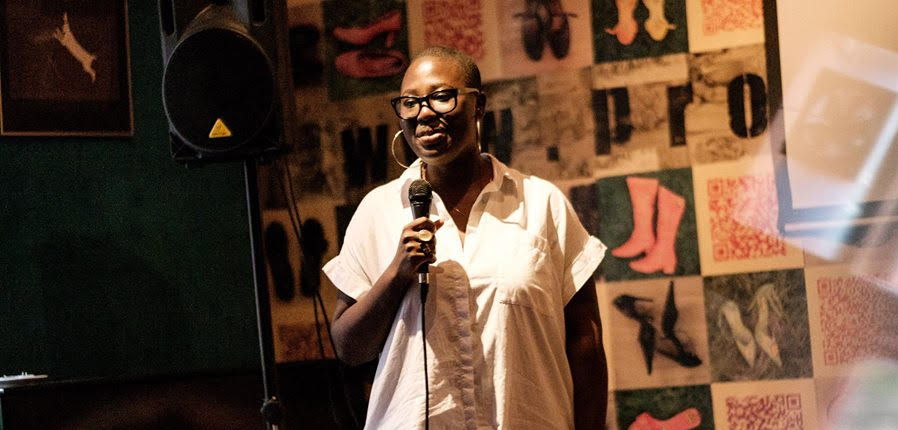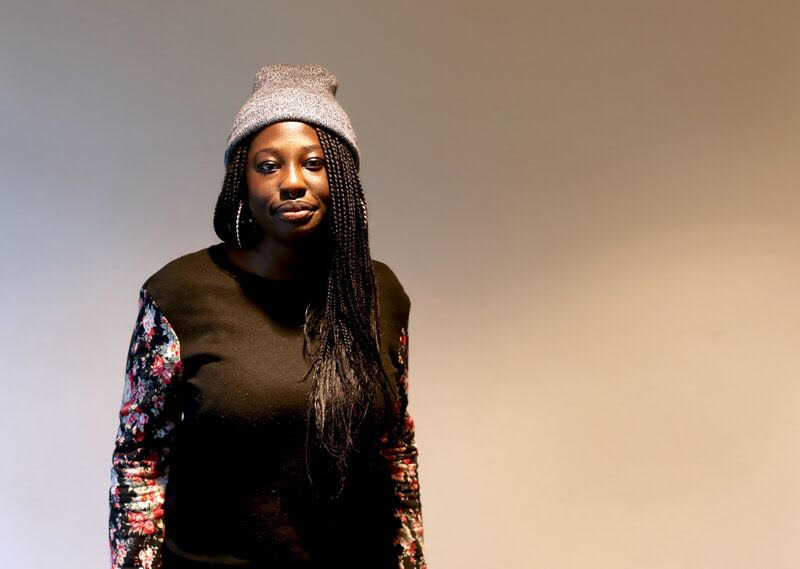
Poetry cornered
Ahead of National Poetry Day on 28 September, poet, writer, journalist and teacher, Bridget Minamore, explains how she makes a living as a poet… some of the time.
How do poets make money? The answer, a lot of the time, is: not through poetry. When I first attempted to live full-time from my words, I expected to make money in one of three ways: poetry on the page (through pamphlets and collections), poetry for the people (through commissions), and poetry in person (via poetry readings and spoken word gigs). Three years into my freelance career, my perception of how to make money as a poet has changed somewhat. These days, I understand that while I tend to call myself a poet first and foremost, of all the work I do to make a living, I probably spend the least amount of time actually sitting down to write poems. I’m a poet who doesn’t write a lot of poetry, a writer who doesn’t spend most of her time writing.
As a rule, most poets deemed ‘spoken word artists’ tend to self-publish…
When I first started writing poems as a teenager, I had very little idea of where poetry would take me. I fell into the poetry world via theatre, then found myself winning poetry slams (live X Factor-style readings where poets compete against one another). Suddenly, I was a poet, but I had little to show for it. Most slams don’t provide any monetary compensation – even if you win – and, in the early days, I was only occasionally offered money as a guest performer. Back then, this was fine. I was a teenager, and then in university, so money wasn’t a defining factor in my thought processes. When I did eventually start being paid for poetry readings, I barely cared that the money was negligible: it was more than I’d earn in 3 hours working behind a bar, so it felt like a lot.
Then I grew up. Leaving university, I found myself relatively well-respected on the spoken word scene and knew that I wanted to write for a living, but I had no idea how. I come from a background where no-one I knew worked in the creative industries, and so I found myself being laughed at for asking questions many of my creative peers found rudimental. Navigating how to be self-employed was a painful, exhausting process; so too were the more basic aspects of working for myself. I remember how baffled I was the first time I was asked to send an invoice to a poetry organization for a gig. I had never seen a creative invoice and had no idea what one looked like. In the end, I sent a panicked email to a couple of older poets I knew – Hollie McNish and Steven ‘Polarbear’ Camden – and they sent me samples of their invoices to use as a template. I used the resulting mash-up template for years. I still think it’s one of the best things anyone has ever done for me.
Traditionally, poets always needed to teach to supplement their income and, in recent years, there have been more opportunities for this than ever before.
Today, my working life varies week-by-week, day-by-day, hour-by-hour. Publishing my pamphlet Titanic with Out-Spoken Press was a defining moment in my poetry career. Out-Spoken Press is a small independent publishing house that has published a few other poets active on the spoken word scene. As a rule, most poets deemed ‘spoken word artists’ tend to self-publish, or work with presses like Burning Eye Books that focus explicitly on championing spoken word. In those instances, you have the potential to make a comparatively high amount of money if your books sell (very) well. However, you also need to be prepared to do your own marketing, design, and editing, or find people yourself to do them for you. I knew with certainty that I had no time to do this, and that even if I did, I wouldn’t be able to do it well. Out-Spoken Press works so well for me because it provides the support someone like me needs with publication. It has strong networks, a solid poetic vision, and a commitment to getting the most out of the books they sell. I don’t make as much from each book as I could if I had published it myself, but I know I wouldn’t have sold anything like as many without them.
Alongside Titanic, I also get relatively modest amounts of money to read my work at everything from corporate events to literary festivals. This autumn, for example, the poets of Out-Spoken Press are heading off on a UK-wide poetry tour at venues and events, including Cheltenham Literature Festival. While this provides a great way to get my poetry out there, I’ve always preferred to teach in a classroom than be on a stage. Traditionally, poets always needed to teach to supplement their income and, in recent years, there have been more opportunities for this than ever before. Poetry’s rising profile on platforms like YouTube, and even on television adverts, has led to a rising demand for people who can help others to write themselves. I’ve always loved teaching – I began running drama and poetry workshops with young people when I was still a teenager – but it can be exhausting work. Now, while it’s always wonderful to be contacted out of the blue by a poetry-loving teacher, I do most of my schools work with The Poetry Society. Like with Out-Spoken publishing, this allows me to outsource all the admin related to working in schools, and means I can focus on the poetry and the young people themselves.

I do a lot of freelance journalism, too – mostly around pop culture and music – and I find myself being asked to speak on panels about politics, as well as appear on radio or on podcasts. I’ve just finished recording a documentary for BBC R4 on women, revolution and poetry that will be aired in mid-October, which taught me how much I love speaking about poetry, but also made me realise how little I want to move into broadcast mediums like television. I get the occasional poetry commission, but after a deeply uninspiring time writing a poem for a large corporation a few years ago, I’m selective about who or what I’ll say yes to. My most recent big commission was for Historic England, to promote its Valentine’s Day campaign, and I loved it. Inspiring people to look at the environment around them was something I found easy to justify. Helping to sell things to line the pockets of brands is less so.
Of the many jobs I do, the one thing they all have in common is that they are about my writing more than they are about me. I’m lucky enough to be doing well enough from my writing to stay on this path. Making a living from poetry has never been easy, or simple. But the fact that so many poets are managing to survive from their words shows that today, it’s perhaps more possible to do so than it has ever been.
Bridget Minamore is a writer from and based in south-east London. She is part of the creative team behind Brainchild Festival and works with charity My Body Back, a project to empower women who have experienced sexual violence. She has worked with British African theatre company Tiata Fahodzi, and runs poetry workshops – mostly for young people – around the UK.
As a journalist, Bridget has written for publications like the Guardian, Pitchfork, The Pool, and The Debrief. She mostly writes about London, pop culture, race, and feminism, as well as the intersections between them.
She was recently named in Speaking Volumes’ ‘40 Stars of Black British Literature’. Her first pamphlet Titanic (Out-Spoken Press) came out in May 2016.
